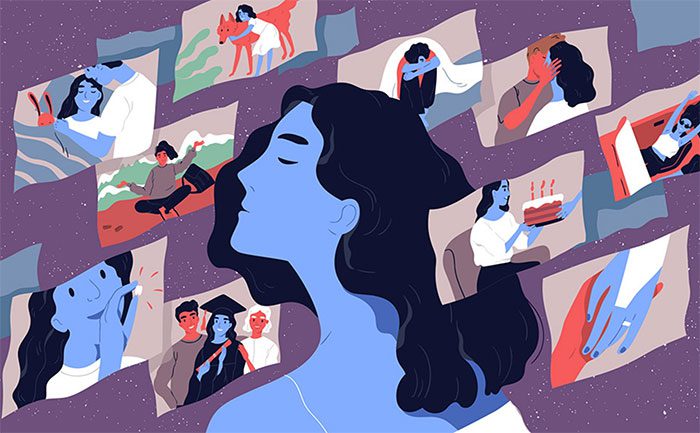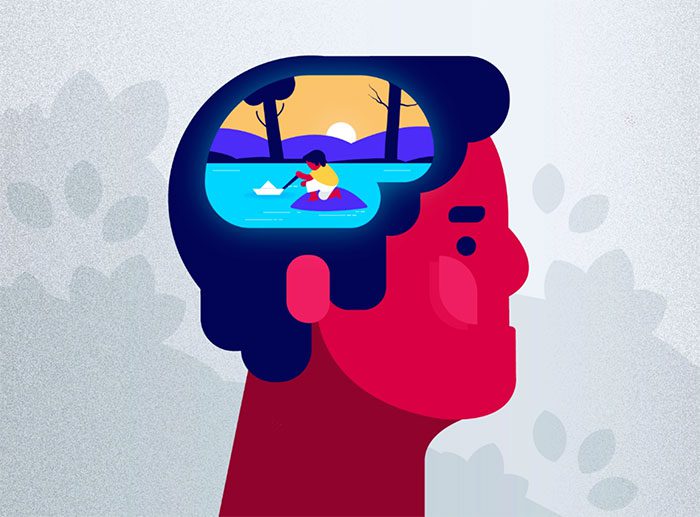Most of us want to believe that we have a good memory. Aside from the times we forget where we put our keys, our wedding anniversary, or someone special’s phone number, when it comes to recalling important things, such as a childhood event, can we trust the accuracy of our memories?
Recent studies have demonstrated just how fragile human memory can be. We are prone to errors, and small suggestions can trigger distorted memories. Even those with remarkable memories can create their own false recollections without realizing it.
Research

Sometimes old memories can obstruct or alter our new memories. (Illustrative image).
In a famous experiment conducted in 1995, memory expert Elizabeth Loftus convinced 25% of participants to believe in a false memory that they had been lost in a shopping mall as children. Another study in 2002 showed that half of the participants were misled and came to believe that they had once ridden in a hot air balloon by being shown fabricated evidence in the form of photographs.
Although these false memories mostly revolve around trivial events and have minimal consequences, they can sometimes lead to serious repercussions. For example, a false memory presented in a criminal testimony could lead to the wrongful conviction of an innocent person. So why do these inaccurate memories form?
Inaccurate Perception
Human perception is imperfect. Sometimes we see things that aren’t there and miss obvious details right in front of us. In many cases, false memories form because information was not encoded accurately from the start. For instance, a person might witness an accident but not have a clear view of everything that happened.
Recounting events that occurred can be difficult or even impossible because they did not actually witness all the details. A person’s mind may fill in the “gaps” by forming memories that did not actually happen.
Inference
In other cases, old memories and experiences may conflict with newer information. Sometimes, old memories obstruct or alter our new memories. In other situations, new information can make it difficult for us to remember previously stored information. When piecing together old information, there can occasionally be gaps in our memory.
Our minds try to fill in these gaps, often using current knowledge as well as beliefs or expectations.
For example, a person might clearly remember where they were and what they were doing during the September 11 attacks. While you may feel that your memory of this event is quite accurate, it is highly likely that your recollection has been influenced by news reports and narratives about the attacks that followed.
This new information competes with your existing memories of the event or fills in missing details.

Sometimes strong emotions can make an experience more memorable. (Image: Henry Kunjumon | Dribbble).
Emotions
If you have ever tried to recall the details of an emotionally charged event (for example, an argument, an accident, or an emergency situation), you may realize that emotions can distort your memory. Sometimes strong emotions can make an experience more memorable, but at other times they can lead to distorted or unreliable memories.
Researchers have shown that people tend to remember events related to strong emotions more vividly, but the details of such memories are often questionable. Recounting significant events can also lead to false beliefs about the accuracy of memory.
Misinformation
Sometimes accurate information gets mixed with misinformation, distorting our memories of events. Loftus has studied memory distortion since the 1970s, and her work has highlighted the serious consequences that such misinformation can have on memory. Participants in her studies were shown images of a traffic accident.
When asked about the event after viewing the images, the interviewer provided leading questions or misleading information. Later, when testing the participants’ memories of the accident, those who received misleading information were significantly more likely to have false memories of the event.
The potential severe impact of this misinformation effect can easily be observed in criminal justice, where distortion can lead to life-or-death differences. Brainerd and Reyna (2005) argue that false memories formed during interrogation are a leading cause of wrongful convictions.
Misattribution of Information
Have you ever mixed up the details of one story with those of another? For instance, when recounting your recent vacation to friends, you might mistakenly relate an event that actually occurred during a trip several years ago.
This is an example of how misattribution of information can lead to false memories. This can include combining elements from different events into a cohesive story, misremembering where you gathered a specific piece of information, or even recalling imaginary events from childhood and believing they were real.
Fuzzy Trace Theory
When forming a memory, we do not always focus on the factual details; instead, we often remember an overall impression of what happened. The fuzzy trace theory suggests that sometimes we create detailed traces of events, while at other times we only remember the main ideas. Detailed traces are based on actual events as they occurred, while remembering main ideas focuses on our interpretation of those events.
Sometimes the way we interpret information does not accurately reflect what actually happened. Biased interpretations of events can lead to false memories about the original occurrences.




















































